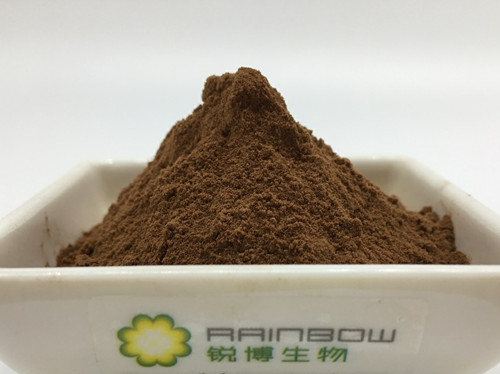The use of Rhodiola rosea is gaining popularity in the United States as an effective treatment for stress. It is known to have a soothing effect on the body, and may provide relief for patients with anxiety, depression, and generalized anxiety disorder. In addition, the plant is said to boost the immune system, aid in the recovery of the body, and promote a healthier, more balanced mood.
Rosavin and salidroside, the main active ingredients in the extract of Rhodiola rosea root. They are thought that rhodiola can be used for strengthening of the immune system, treatment of diabetes, pulmonary hypertension, and cerebrovascular diseases and improving sports performance. They suggest that Rhodiola extract might promote memory and learning. Other possible benefits include improved physical performance, increased resilience, reduced stress, and a reduction in fatigue. Its antioxidant and anti-inflammatory properties have been shown to be beneficial to the body. In addition, it is believed that the extract may protect the cells from damage.
- Excellent antioxidant properties
The anti-oxidant properties of Rhodiola root are well known. The herb helps in the prevention of oxidative stress, thereby protecting the brain from neurotoxicities. Salidroside, a phenylpropanoid glycoside, is the most important bioactive constituent of the plant. It exhibits diverse biological activities, such as inhibition of protein kinase B (PKB), apoptosis, autophagy, and mTOR pathway. It has been shown to induce the PI3K/Akt pathway, alter the cell cycle, and prevent aging-like phenotype in an oxidant-induced model.
The strong antioxidant effect can promote cognitive functions, promote protein synthesis, reduce acid phosphatase activity, improve SOD and GSP-Px activity, inhibit the formation of LPO and the degeneration of organelles, and delay or prevent the aging of cerebral cortex neurons, glial cells, synapses and blood-brain barrier in rats. Rhodiola Rosea extract can delay cell senescence, promote cell growth and cell metabolism, inhibit the degenerative changes of rough endoplasmic reticulum and mitochondria, enhance liver glycogen synthesis, inhibit the formation of lipofrigin in liver cells, and reduce the content of LPO in liver tissue. Rhodiola can also promote the division and synthesis of fibroblasts in the dermis and the secretion of collagen. At the same time, it also secretes collagenase to decompose the original collagen, but the secretion is greater than the decomposition amount. Rosalidroside could significantly reduce LPO and lipofuscin content in blood, liver and testis of 14-month-old mice. Rhodiola root extract can improve the immunity of the body and the exercise ability of the muscle, increase the activity of SOD and reduce the content of TG in blood.
- Improves endurance exercise performance
They also have been studied for their impact on the antioxidant capacity of the body. In addition, they have been found to improve the endurance of the muscles. Some studies have shown that Rhodiola can help fight fatigue and increase endurance. In a study published in the International Journal of Sports Nutrition and Exercise Metabolism, it was shown that Rhodiola rosea supplementation improved endurance and mental capacity of young, healthy volunteers. It was found to increase the resistance to a variety of stressors and reduce stress-related fatigue and enhance cognitive function.

3% Rosavin
- Prevents AMS
Acute mountain sickness (AMS) is a dangerous condition that affects the body at high altitudes. The most lethal type of AMS is pulmonary edema. It is usually the result of sudden exposure to high altitudes. However, it can also occur at low altitudes. Therefore, it is necessary to find effective means to prevent AMS. There are various herbal remedies that have been used to cure AMS. One of the herbs that is traditionally used in China and Europe is Rhodiola rosea. The extract has also been reported to be effective in rats exposed to hypoxia. Similarly, it has been proven to inhibit TNF protein expression level in H9c2 cells.
The alcohol extract of Rhodiola Rosea root and rhizome can significantly improve the tolerance to hypoxia, reduce the rate of oxygen consumption, prolong the survival time of animals in hypoxia environment, and significantly increase the level of fasting liver glycogen and blood sugar. Rhodiola extract can significantly reduce the overall oxygen consumption of mice, reduce the content of lactic acid in blood, myocardium and brain of rats, and improve the aerobic metabolic process under the condition of hypoxia. Rhodiola alcohol extract can effectively prevent the effects of hypoxic environment on heart and lung function, and inhibit the prolongation of P-R interval, QRS interval and Q-T interval of human electrocardiogram caused by altitude.
- Reduces fatigue
Rhodiola is an adaptogen, which is a type of herb that promotes the body’s ability to withstand and recover from physical and emotional stress. Adaptogens are commonly thought to boost the body’s resistance to stressors, and help the body to adapt to changes in the environment. The herb is thought to help increase mental performance and decrease fatigue during periods of stress. Rhodiola rosea and Rhodiola crenulata help the body to adapt to stress and prevent illness. They may also improve memory and cognition. These herbs also help calm and soothe agitated people. They might reduce the symptoms of depression and other mood disorders.A study published in 2010 by researchers from the University of Utah looked at rhodiola’s effect on physical and mental fatigue. They used an exercise stress test to measure the effect of a salidroside extract, which is one of the active compounds in rhodiola rosea. However, more research is needed to confirm the exact effect of rhodiola on human performance.
- Helping prevent cardiovascular disease
Rhodiola rosea extract has some strong cardioconstriction effect. Experiments in mice have shown that salidroside can significantly reduce the end diastolic indoor pressure and blood pressure of the left ventricle in a short time, reduce the pre and post load of the heart, and also significantly reduce the indicators reflecting myocardial systolic performance, and weaken the systolic performance of the isolated heart. Rhodiola alcohol extract can significantly increase the arterial blood pressure of rats, showing a certain dose-effect relationship, and reverse the phentolamine induced blood pressure drop, but the effect on heart rate did not change regularly. Salidroside has a protective effect on cardiomyocytes damaged by oxygen readministration after hypoxia. It can maintain the normal beating frequency of cardiomyocytes after oxygen readministration after hypoxia, reduce the release of LDH, and maintain the normal ultrastructure of myocardial cell membrane, myofibrils, mitochondria and so on.
- Anti-cancer properties
It have anti-inflammatory properties1(healthline.com). This means that it may be able to prevent the growth of dangerous tumors that are triggered by inflammation, but more research is needed. In vitro experiments of Rhodiola Rosea extract showed that it could inhibit the growth rate and division ability of human nasopharyngeal carcinoma cells and limit the growth and proliferation of cancer cells. Rhodiola rosea also inhibited the growth and proliferation of cultured liver cancer cells in vitro and transplanted liver cancer cells in mice, decreased DNA synthesis, increased glycogen content, and prolonged the survival period of tumor bearing mice. Rhodiola rosea can inhibit hepatocellular carcinoma cells cultured in vitro at s stage. In addition, Rhodiola had an inhibitory effect on S180 cells, and the efficacy was dose-dependent. Its antitumor effect is relatively selective, the same dose has no toxic effect on non-tumor cells, and has been found to have inhibitory effect on HeLa cells.
But, as with any health supplement, Rhodiola should only be used under the guidance of a physician. Currently, the safety of Rhodiola rosea is relatively good. There are very few reports of adverse reactions in studies that lasted at least 6 weeks. However, there have been some reports of drowsiness and dry mouth. While these symptoms are not serious, they should be considered possible side effects. Also, there are no significant drug interactions reported with this herb.
Side Effects
As with any health supplement, Rhodiola should only be used under the guidance of a physician. Currently, the safety of Rhodiola rosea is relatively good. There are very few reports of adverse reactions in studies that lasted at least 6 weeks. However, there have been some reports of drowsiness and dry mouth. While these symptoms are not serious, they should be considered possible side effects. Also, there are no significant drug interactions reported with this herb. However, research is still lacking to determine how the plant works on the human body.
Although Rhodiola may be safe to use, it is not recommended for pregnant women or nursing mothers. there is no research on the safety of Rhodiola during pregnancy. Furthermore, people with thyroid disease should avoid taking it. Using Rhodiola with other drugs that suppress the immune system could increase the risk of developing an autoimmune condition. Taking Rhodiola may affect the levels of blood sugar. If you have diabetes, it is important to consult with your doctor before attempting to take a supplement. People with heart problems or high blood pressure should avoid using Rhodiola.
Lastly, those with a history of seizures should not take this herb. While the herb is not known to cause any major adverse reactions, it is not advised for patients on SSRIs or MAOI medications. Lastly, While there are many health benefits of Rhodiola rosea, there are no long-term safety studies to support these claims. Researchers are still exploring the potential for this herb, and more research is expected to be conducted in the future.
Dosage
Supplementation of rhodiola rosea extract tends to refer to either the standard extract with the ration extracts both 3% rosavins and 1% salidroside. If you take rhodiola as a daily preventative against fatigue, doses as low as 50mg have been reported to be effective, and acute usage for fatigue and anti-stress has to be taken in the 100-600 mg range.
- Dandelion Extract: What It Is, Benefits, Uses and Side Effect - April 23, 2024
- Is Berberine Extract Help For Weight Loss? - April 11, 2024
- Why Is Pysllium Husk Powder A Popular Meal Replacement Ingredient? - April 3, 2024



